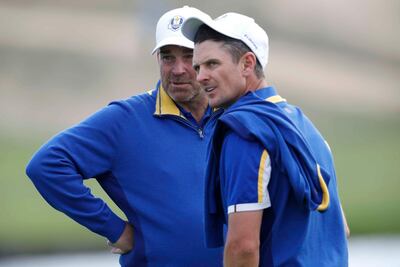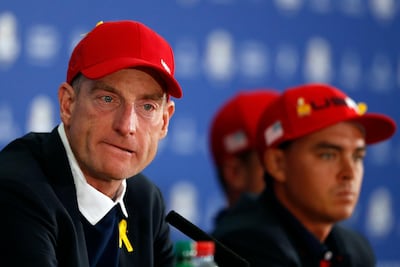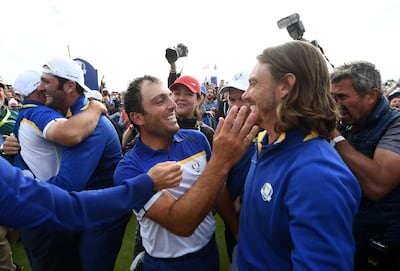European unity still top trump
Rory McIlroy referenced it repeatedly. Justin Rose reinforced it.
“The togetherness of the team, the great camaraderie we have…” McIlroy said on Sunday. “Once we get together for the Ryder Cup, we all come together as one.”
Rose agreed, although emphasising it was not all fun and games in Team Europe. “This team was relentless in its pursuit of excellence,” he said.
And that’s just it. Europe have the perfect blend of brotherliness and backbone.
The United States, for all they try, are not quite there yet. Take Patrick Reed, who within hours of the curtain coming down in France gave an explosive interview to the New York Times, calling out captain Jim Furyk and confirming an issue with teammate Jordan Spieth.
Granted, the Americans boast a better togetherness than in the past, and the youthful element in the team suggests that will only fortify. But, for the moment, Europe remain way ahead.
Fasten that comradeship to their undoubted talent, and it’s the recipe for prolonged success. It is a huge reason why they have won nine of the past 12 Ryder Cups.
Put plainly, as a group, they seem to just want it more.
“Moliwood” combines to break America
It proved a pairing for the ages.
Coming into the week, Francesco Molinari and Tommy Fleetwood were already good friends, but their perfect partnership in France only strengthened the bond. Unstoppable together, they played in tandem four times and registered four victories, becoming the first European pair in Ryder Cup history to achieve the feat.
They were highly compatible and hugely convincing. They even saw off Jordan Spieth and Justin Thomas, easily the US’s strongest duo.
They gushed about one another. In the post-event news conference, a typically high-spirited affair for the winning team, they blew kisses at each other.
Undeniably, “Moliwood” became one of the stories of the week, a pivotal collaboration that hints at future Ryder Cup success. Their games patently complement each other; their temperaments, too.
More generally, Europe had more obvious partnerships. Tiger Woods remains a hard teammate to pair with, while Phil Mickelson’s woeful form made foursomes point-scoring nigh impossible.
On the other hand, Molinari and Fleetwood were just the lead duo in a team packed with well-matched mates.
Burnout Woods needs a break
He arrived in France amid much fanfare. He departed clearly fatigued, almost funereal.
"I played seven out of nine weeks,” Tiger Woods mumbled in the aftermath. "A lot of big events, a lot of focus, a lot of energy goes into it.”
The American looked so spent in the media debrief that you would be hard-pressed to find anywhere else he would rather not have been. That summed up his entire week.
Woods lost all four matches, including a singles defeat to Jon Rahm that felt crucial as momentum threatened to swing in US favour. At times during the three days, Woods appeared slow and unsure, polar opposite to his pep during the headline-hogging Tour Championship victory the previous week.
"For me, it's been a lot of golf in a short period," he imparted.
Entering the season with significant doubts surrounding his health, he played 19 events. He missed only two cuts.
That said, his Ryder Cup record remains the great anomaly in a superstar career. His overall account reads 13 wins from 37 matches. He has been on the winning side once in eight attempts.
Bigger picture, it probably will not affect Woods that much. But after a season full of vigour and victory, both personal and professional, he blatantly needs some rest.

Bjorn’s picks anything but wild
Thomas Bjorn preferred to let his players take the credit.
“This has been easy,” he said on course on Sunday, once it was confirmed the cup was coming back to Europe. “It’s all down to the 12 players, no one else.”
That is not entirely true.
Having gathered his thoughts later that evening, Bjorn paid tribute to the back-room staff, a sentiment echoed by his players. Albeit reluctantly, he then accepted some praise.
Admittedly, captains do not hit shots, but they can make defining decisions. One of Bjorn’s most telling was in choosing his wildcards.
His four picks – Sergio Garcia, Ian Poulter, Paul Casey and Henrik Stenson – delivered 9.5 points, while Furyk’s lost 10 of their 12 matches.
“They make the difference in the score,” Bjorn said. “I think I got it right.”
He will feel especially vindicated in his selection of Garcia, the Spaniard whose inclusion had been heavily questioned. Yet Garcia responded by supplying three points, his Sunday victory against Rickie Fowler lifting him to 25.5 overall and to the top of the all-time Ryder Cup list for Europe.
In his four wildcards, Bjorn opted for experience to counterbalance the five rookies in the team.
Without question, he provided the platform for success.

Furyk's players must bear the brunt
So the US were defeated 17.5-10.5, a greater margin of defeat than the last time they contested the cup in Europe.
At Gleneagles, the fallout led to the "Task Force", a committee designed to wrest back the initiative in what had become a largely one-sided clash. This time around, the recriminations were not quite so incendiary, irrespective of Reed’s regrettable outburst.
Spieth complimented Furyk on his captaincy. As did Mickelson, the architect of the acrimony four years earlier.
However, Furyk was not without fault.
To much surprise, he split up the Spieth-Reed axis, an almost impenetrable partnership that had combined for five victories and two ties from eight previous matches. He benched the latter twice, despite Reed’s position as the US’s top points-scorer in the previous two events.
Furthermore, Furyk's selection of the wildly erratic Mickelson for the substantially punitive Le Golf National proved ill-advised. More broadly, his players seemed under-prepared for the infamously tight track, aside from Thomas, the only American member to compete in this summer's French Open.
But, in hindsight, it is easy to nit-pick.
Such is the nature of elite-level sport, there will be inquest, a picking apart of the failure. Yet, when all is said and done, his players did not deliver. Europe simply played better.
“It was some exquisite golf,” Mickelson conceded. “They flat-out beat us.”




